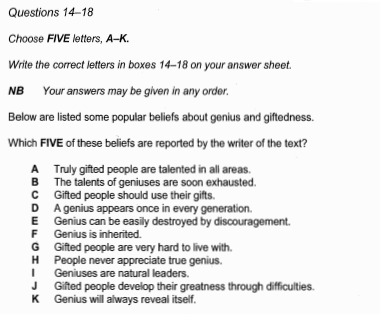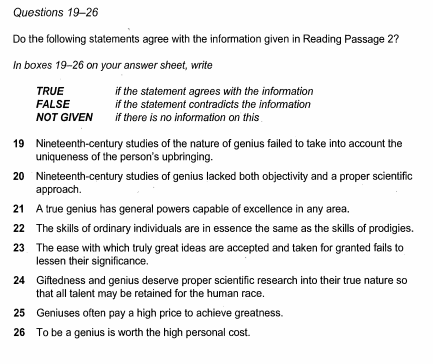剑桥雅思8阅读:Test3雅思阅读PASSAGE 2真题+答案+解析
发布时间:2020-12-25 关键词:READING PASSAGE 2
You should spend about 20 minutes on Questions 14 -26, which are based on ReadingPassage 2 below,
The Nature of Genius
There has always been an interest in geniuses and prodigies. The word 'genius', fromthe Latin gens (= family) and the term 'genius', meaning 'begetter, comes from theearly Roman cult of a divinity as the head of the family. In its earliest form, genius wasconcered with the ability of the head of the family, the paterfamilas, to perpetuatehimself. Gradually, genius came to represent a person's characteristics and thence anindividual's highest attrbuteus derived from his 'genius' or guiding spirit. Today, peoplestill look to stars or genes, astrology or genetics, in the hope of finding the source ofexceptional abilities or personal characteristics.
The concept of genius and of gifts has become part of our folk culture, and
attittets are ambivalent towards them. We envy the gitted and mistrust them. In themythology of gitedness, it is popularly believed that if people are talented in one area,they must be defective in another, that inellecuals are impractical, that prodigies
burn too brightly too soon and bum out, that gited people are eccentric, that theyare physical weaklings, that there's a thin line between genius and madness, thatgenius runs in families, that the gitted are so clever they don't need special help, thatgiftedness is the same as having a high IQ, that some races are more inelilent ormusical or mathematical than others, that genius goes unrecognised and unrewarded,that adversity makes men wise or that people with gifts have a responsbilit to
use them. Language has been enriched with such terms as "highbrow', 'egghead','blue-stocking', 'wiseacre', "know-all, "boftin' and, for many, 'inelletua is a term ofdenigraticn.
The nineteenth century saw considerable interest in the nature ol genius, andproduced not a few studies of famous prodigies. Perhaps for us today, two of themost significant aspects of most of these studies of genius are the frequency with
which early encouragement and teaching by parents and tutors had beneficial effectson the inelllla artistic or musical development of the children but caused greatdififiti of adjustment later in their lives, and the frequency with which abilties
went unrecognised by teachers and schools. However, the diffitt with the evidenceproduced by these studies, fascinating as they are in collecting together anecdotesand apparent similarilis and exceptions, is that they are not what we would todaycall norm-referenced. In other words, when, for instance, information is collated
about early illeses, methods of upbringing, schooling, etc., we must also take intoaccount information from other historical sources about how common or exceptionalthese were at the time. For instance, infant mortality was high and life expectancymuch shorter than today, home tutoring was common in the families of the nobility
and wealthy, bullying and corporal punishment were common at the best independent
schools and, for the most part, the cases studied were members of the privilegedclasses. It was only with the growth of paediatrics and psychology in the twentithcenlury that studies could be carrled out on a more objective, if stll not always veryscientific, basis.
Geniuses, however they are delined, are but the peaks which stand out throughthe mist of history and are visible to the particular observer from his or her particularvantage point. Change the observers and the vantage points, dear away some of themist, and a dfferent lot of peaks appear. Genlus Is a term we apply to those whomwe recognise for their outstanding achievements and who stand near the end of thecontiuum of human abilties which reaches back through the mundane and mediocreto the incapable. There is stil much truth in Dr Samuel Johnson's observation, Thetrue genius is a mind of large general powers, accidentally determined to some
particular direction. We may disagree with the 'general', ftor we doubt if all musiciansof genlus could have become sclentists of genlus or vice versa, but there is no
doubing the accidental determination which nurtured or tiggered their gitts into
those channels into which they have poured their powers So succosstully. Along thecontiuum of ailies are hundreds of thousands o gited men and women, boys andgirts.
What we appreciate, enjoy or marvel at in the works of genius or the achievementsof prodigies are the manilestations of sils or abities which are similar to, but so
much superior to, our own. But that their minds are not dfferent from our own isdemonstrated by the fact that the hard-won discoveries of scientists like Kepleror Einstein become the commonplace knowledge of schoolchildren and the onceoutrageous shapes and colours of an artst like Paul Kee so soon appear on the
fabrics we wear. This does not minimise the supremacy of their achievements, whichoulstrip our own as the sub-lour-minute mllers outstrip our jogging.
To think of geniuses and the gited as having uniquely diferent brains is only
reasonable it we accept that each human brain Is uniquely dffrent. The purpose ofinstruction is to make us even more difterent from one another, and in the processof being educated we can learn from the achievements of those more gifted thanourselves. But before we try to emulate genluses or encourage our children to do sowe should note that some of the things we learn from them may prove unpalatable.We may envy their achievements and fame, but we should also recognise the
price they may have paid in terms of perseverance, single-mindedness, dedication,restrictions on their personal lives, the demands upon their energies and time, andhow oten they had to display great courage to preserve thelr integnty or to make theirway to the top.
Genius and gitedness are relatve descriptive terms of no real substance. We may,at best, give them some precision by defining them and placing them in a context but,whatever we do, we should never delude ourselves into belleving that gited childrenor geniuses are diferent from the rest of humanity, save in the degree to which theyhave developed the performance of their abilties.
天才的本性
人们总是对天才和神童感兴趣。genius 一词源于拉丁文 gens(家庭、家族),以及术语 genius(相当于 begetter,意为“生产者、父亲”),产生于早期罗马人担任家族时的神学仪式。 在 其 最 初 期 形 式 中 ,g e n i u s 是 与 家 族 领 袖 ,即 家 长 的 自 我 永 生 能 力 相 关 的 。 逐 渐 地 ,g e n i u s 开 始 代表一个人的特性,并且从那时起,人们认为个体的属性源于他的“天赋”或者引导性精神。 今天,人们仍然留心星象或者基因,占星学或者遗传学,期望寻找到杰出的能力或者个人特点的 根源。
天才或者天赋的概念已经变成民间文化的一部分,但是人们对于它们的态度是矛盾的。我 们妒忌有天赋的人并且不信任他们。在天才神话中,人们普遍认为,如果一个人在某一方面具有 天赋,他们必然在另一方面有缺陷 ;知识分子是不切实际的 ;神童只是昙花一现 ;有天赋的人都 是古怪的人 ;他们都是身体虚弱的人 ;天才和疯子只有北京之隔 ;天才是家族传统 ;有天赋的人 是如此聪明以至于他们不需要特别的帮助 ;有天赋的人就是有高智商的人 ;一些种族就是更为 聪明、更喜欢音乐或者更具有数学才能 ;天才没有得到认可和回报 ;逆境使人聪明或者有天赋之 人有责任去发挥天赋。语言也因为“知识分子”、“理论家”、“女才子”、“自以为聪明者”、“自称无 所不知者”、“专注于科技研究(尤指军事)的科学家”这些术语而丰富,但是对许多人而言,“知识 分子”是一种诋毁性的术语。
19 世纪见证了人们对天才本性的巨大兴趣,并且产生了不少关于神童的研究。这些绝 大部分关于天才研究中,两个最为重要的方面是关于两种几率,其一是父母和家庭教师在早期频 繁的鼓励和教诲对小孩智力、艺术或者音乐的发展产生有益影响,但是也会造成孩子们很难适应 之后的生活 ;另外一种是小孩的能力未得到老师和学校辨识的几率。这些研究因为收集了趣闻、 明显的相似性和例外而引人入胜,然而这些研究提供的证据的困难在于,他们并非是我们如今所 认为的常规参照认定法。换言之,比如,在收集早期疾病、养育方法、学校教育等信息时,我们也 必须从其他历史渊源来研究这些信息在当时是否常见或特别。例如,以前的婴儿死亡率高、预期 寿命短,上门家教在贵族和富人家庭很普遍,在的独立学校暴力和体罚是很普遍的 ;并且, 一般而言,所研究的实例都是有特权的阶层。只是随着二十世纪儿科和心理学进一步发展,这些 研究才在一个更为客观的基础上进行,即便现在还没有建立科学的基础。
天才的定义明确,然而,天才仅是耸立于历史雾霭中,特定的观察者从其自身特有的优势地 位所观察到的高峰。变更观察者和优势地位、清除一些雾霭,不同的山峰就会浮现。天才是 一个术语,我们用它来指那些我们承认他们杰出成就的人,那些站在人类才能的连续体的末端附 近,这些才能回顾了从平凡、平庸到无能。Samuel Johnson 的观察仍有不少真理存在,“真正的 天才是具有普遍天赋的聪明人,在某个特定方面偶然间出现的。”我们可能不同意“普遍”这一 点,因为我们怀疑是否所有的天才音乐家都能成为天才科学家,或者所有天才科学家都能成为天 才音乐家。但是,毫无疑问的是,正是意外的决心培育并激发了他们的天赋,使他们进入特定的 领域,最后一举成功。绵延不绝的才能之路,有成千上万天赋异禀的男人和
女人,男孩和女孩。
天才的工作和神童的成就中,为我们所欣赏、喜欢或者感到惊奇的是我们具备相似的技能或 者能力,但他们的表现却大大超越了我们。然而,天才的大脑与我们并无异,像开普勒、爱因斯坦 这样的科学家,他们来之不易的科学发现变成了小学生的常识,像 Paul Klee 这些艺术家曾经反 常的外形和色彩很快就出现在我们穿的织物上,这些都证明了这一点。但是天才们的成就没有 因此而被人藐视,他们的成就高出我们,这就好比参加四分钟内跑完一英里的运动员比我们慢跑 做得是一样的。
只有当我们认可每个人的大脑是独特的、不同的,认为天才和有天赋的人有独特的、不同的 大脑这种想法才是合理的。指导的目的在于使我们相互间更为不同,在受教育过程中,我们可以 从比我们更有天赋的人那里学到他们的成就。在我们试图努力赶上或者鼓励我们的孩子赶上他 们之前,我们应该注意到,从他们那学的一些东西未必就好。我们可能羡慕他们的成就和名声, 但是我们应该察觉到他们所做的牺牲,如在坚持不懈、专心、奉献、受限的个人生活、精力与时间 上的要求,以及为维持他们的正直或者为了站到顶峰需要不断展示出巨大勇气这些方面。
天才和有天赋的人是对非具体实体的一个相对描述性的术语。我们可能充其量通过定义他 们并把他们放置在的背景中来让他们更为精确,但是,无论如何,我们决不能欺骗我们自己, 去相信有天赋的小孩或者天才有别于其他人,除了他们发展才能的程度。


体裁:说明文
主要内容:天才的本性。
结构:
第 1 段 :总体介绍 Genius(天才)的概念和起源。
第 2 段 :人们对天才的态度往往带是有矛盾情绪的。
第 3 段 :19 世纪对于天才的研究情况。
第 4 段 :天才有明确的定义,然而天才又具有相对性。
第 5 段 :天才的大脑与普通人并无异常。
第 6 段 :进一步论述了天才的大脑并无异常。
第 7 段 :总结了有天赋的小孩或者天才并无异于其他人。
师资点题剑桥雅思8阅读:
考题解析
Questions 14-18
题型归类 :Multiple Choice
该题与一般的 Multiple Choice 不太一样,它要求考生在 11 个选项中选出 5 个正确答案来。
题目解析
题目编号 14-18
题目定位词 popular beliefs
答案位置 第二段
题解 选项含义如下 :
A 真正的天才在各个领域都具备天赋。 B 天才的天赋会瞬间消失殆尽。
C 有天赋的人需要使用他们的天赋。
D 天才在每一代人中出现一次。
E 天才很容易由于遭受打击而被摧毁。 F 天赋是遗传的。
G 天才很难相处。
H 人们从不欣赏真正的天才。
I 天才是天然的。
J 有天赋的人在困境中发展他们的天赋。 K 天赋总是能显露出来。
文章第二段主要讲了人们对天才的各种观点,所以以上这些观点是否正确可 通过文章第二段来确定。
A 选项跟文章中的论述相反,第二段第 3-4 行说到 if people are talented in one area, they must defective in another,意思是“如果一个人在某一方面具 有天赋,他们必然在另一方面有缺陷”,因此天才并非是在各个领域都具备 天赋的。A 选项错误,不能选。
B 选项的对应点在第二段第 4-5 行 prodigies burn too brightly too soon and burn out 意思是“神童只是昙花一现”,因此 B 选项正确。
C 选项对应第二段倒数第 4 行 people with gifts have a responsibility to use them“有天赋之人有责任去发挥天赋”,言下之意也就是有天赋的人需要使 用他们的天赋。因此 C 选项正确。
F 选项对应第二段第 7 行 genius runs in families“天才是家族传统”,也就是 说天赋是遗传的。因此 F 选项正确。
H 选项对应第二段第 2 行 we envy the gifted and mistrust them,因此说明人 们并不会真正欣赏天才。H 选项正确。
J 选项对应第二段倒数第 3 行 adversity makes men wise“困境让人变得具有 智慧”,因此说明天才在困境中发展其天赋。J 选项正确。
其他选项在文章中都没有提及。
师资点题剑桥雅思8阅读:
考题解析
Questions 19-26
题型归类 :TRUE/FALSE/NOT GIVEN
题目解析
题目编号 题目关键词 题目句意 题解
19 Nineteenth- century studies 19 世纪对于天才的 天赋的研究并没有考 虑到天才教养的独特 性。 TRUE 根据第三段(70 页倒数第 5 行)可以得知,原文只提到了研究会 考 虑 the method of upbringing, 但 是 没有考虑到 uniqueness of the person’s upbringing,题目表述符合文意。
20 Nineteenth- century studies, lack 19 世纪对于天才的 研究缺乏目标和合适 的科学方法。 TRUE 根 据 nineteenth-century 可 定
为到第三段,根据第三段最后一句话 “只是随着二十世纪儿科和心理学进一 步发展,这些研究才在一个更为客观的 基础上进行,即便现在还没有建立科学 的基础”来判断,题目表述是正确的。
21 true genius 一个真正的天才在任 何领域都具备普遍的 才能。 FALSE 根据解答第 14-18 题的经验, 可直接判断题目表述是错误的。
22 same 普通人的技能和神童 的技能在本质上一致 的。 TRUE 根据第五段的首句可以知道, 天才的技能和普通人的技能在本质上是 相似的,尽管在表现上不一样。题目表 述符合文意。
23 truly great ideas 伟大的思想接受起来 的很容易,有时我们 还会认为这是理所当 然的想法,但是这不 能削减这些思想的重 要性。 TRUE 定位到第五段的最后两句话 “像开普勒、爱因斯坦这样科学家来之
不易的科学发现变成了小学生的常识、 像 Paul Klee 这些艺术家曾经反常的外 形和色彩很快就出现在我们穿的织物 上,这些都证明了这一点。这没有减少 天才们至高的成就”。题目表述正确。
24 Giftedness and genius 天赋和天才值得让科 学研究深入其本质, 以至于所有天赋都能 被人类所保留。 NOT GIVEN 定位到第七段,第七段 提到了“我们可能充其量通过定义他们 和把他们放置在的背景中来让他 们更为精确”,但是题目表述的观点在 文章没有提及,可能正确,也可能不正 确。
25 pay a high price 天才们通常为取得伟 大成就付出。 TRUE 定位到第六段的最后一句话we may envy their achievement and fame, but we should also recognise the price they may have paid in terms of...,由此 可知题目表述是正确的。
26 To be a genius 成为一个天才是值得 付出个人代价 的。 NOT GIVEN 选项表述的一种观点, 但是通读全文后会发现作者并没有提出 这种观点,所以选项表述正确与否无法 判定。




